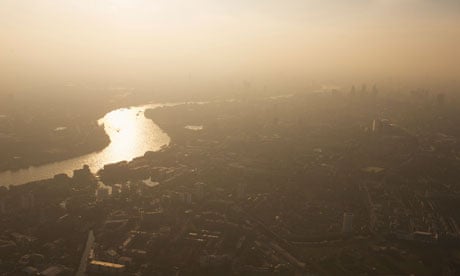The UK government has failed in its legal duty to protect people from the harmful effects of air pollution, the supreme court ruled on Wednesday.
The ruling by five judges – the first time a UK court has recognised that the government has failed in efforts to meet European air pollution limits – delighted air pollution campaigners.
It means the government faces stiff European fines and British cities may have to ban cars and limit the entry of heavy good vehicles to dramatically reduce air pollution.
But because the court also ruled that the European court of justice will have to step in to clarify some legal issues, the government may be able to delay acting for up to a year.
"This landmark decision … paves the way for the European commission to take legal action against the UK," said James Thornton, ClientEarth chief executive. "The ruling marks a turning point in the fight for clean air and will pile the pressure on the environment secretary, Owen Paterson. He must now come up with an ambitious plan to protect people from carcinogenic diesel fumes. Until now, his only policy has been lobbying in Europe to try and weaken air pollution laws."
The group's case concerned 16 cities and regions, including London, Manchester, Birmingham and Glasgow, which government plans show will suffer from illegal levels of NO2, nitrogen dioxide – until as late as 2020 or 2025.
The supreme court confirmed that because the government is in breach of the EU air quality directive, "the way is open to immediate enforcement action at national or European level". However, before deciding whether to take further action to enforce the law, it has referred a number of legal questions to the court of justice of the European Union.
The way is now open for the European commission to take infringement action against Britain without waiting for any ruling by the European court of justice. This could theoretically lead to heavy fines.
"Our assessment [has been] that the UK is already in breach of the air pollution law. We have not taken action against any country yet but we are working our way through different countries," said Joe Hennon, spokesman for EU environment commissioner, Janez Potočnik. "When we have done that we will look at the bigger picture and decide whether to take infringement action against which countries."
With the possibility of heavy fines and European commission action closer, Britain may now have little option but to come forward with ambitious new plans to reduce NO2 pollution in cities. Because most of the pollution is from cars, these could include ultra low-emission zones, bans on certain vehicles and the use of technological "solutions" such as dust suppressants.
The government declined to comment specifically on the case. A spokesman for the Department for Environment Farming and Rural Affairs (Defra) said: "Air quality has improved significantly in recent decades and almost all of the UK meets EU air quality limits for all pollutants."
Stephen Joseph, chief executive of the Campaign for Better Transport, said: "The decision means the government must put public health at the heart of transport policy. In practice this should mean investing in alternatives to cars and diesel vans and trucks, especially in towns and cities. It should also call into question government plans for major new roads."
The London assembly green party member, Jenny Jones said: "This is great news for children and vulnerable people with respiratory and cardiovascular problems living in polluted environments. This judgment will hopefully spur both the government and the mayor of London to finally take effective action on tackling air pollution and get serious about traffic reduction."
Alan Andrews, ClientEarth lawyer, said: "The supreme court recognised that this case has broader implications for EU environmental law: the government can't flout environmental law with impunity. If the government breaks the law, citizens can demand justice and the courts must act.
"The judges were clearly convinced of the serious health implications of allowing air pollution to continue unabated. It was also apparent that the case raised a fundamental question about the rule of law. If the supreme court is unable to give an effective remedy to a clear and admitted breach of EU environmental law, there are grave constitutional consequences.".
"This is a significant judgment that ministers must not ignore," said the Friends of the Earth London campaigner, Jenny Bates. "The UK's attitude to air pollution is a national scandal. We urge government to tackle this crisis, and to scrap plans to build more roads."
Air pollution causes 29,000 early deaths a year in the UK and is linked to heart and respiratory diseases including asthma.

Comments (…)
Sign in or create your Guardian account to join the discussion